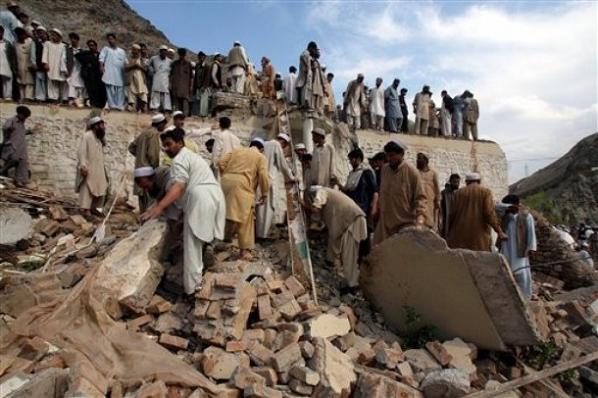Suicide Bombing Kills 35 people in Pakistan
Monday in suicide bombing 35 people were killed near Pakistan's military headquarters while a second explosion wounded several police, continuing a wave of terrorism that prompted the United Nations to suspend long-term development work near the Afghan border.

The rash of attacks by Islamist militants has killed at least 300 people across Pakistan over the past month — including 11 U.N. workers — and threatened to destabilize the nuclear-armed nation.
The violence has grown bloodier since the government launched an anti-Taliban offensive in mid-October, pushing into the impoverished and underdeveloped tribal region of South Waziristan. The U.N. decision to suspend non-emergency aid could weaken efforts to counter the appeal of extremism by improving ordinary people's daily lives.
The first suicide bomber Monday killed 35 people outside a bank near Pakistan's military headquarters in Rawalpindi, just a few miles (kilometers) from Islamabad, The Associated Press reports.
Meanwhile, last week, the northwestern city of Peshawar was rocked by a car-bomb blast at a market that killed 118 people and injured at least 200 others. The attack occurred at a bazaar filled with women's fabric stores and cosmetics shops, and many of the dead and injured were women and children.
"Our forces are fighting to get rid of the terrorists, whether it's in Waziristan or Islamabad," Information Minister Qamar Zaman Kaira said today at a news conference in the capital. "This is not a small group, and these are not simple criminals. But we are fighting them."
Militants have broadened their array of targets in recent weeks. Schools across the country were shut down last month after two suicide bombers attacked a college campus in Islamabad, killing six people. The attack on the women's bazaar in Peshawar was preceded by a devastating suicide car-bomb blast at a bustling market in the same city that killed 53 people, Los Angeles Times reports.
News agencies also report, Mohammad Usman was inside the bank at the time of the blast, cashing his paycheck.
"They were signing my check and suddenly there was this loud explosion," Usman said. "We ran out and I saw some 15 to 20 people sprawled on the ground," he said.
The bank is close to the army headquarters assaulted by militants last month. That attack was a severe blow to the army and a worrying demonstration of the militants' reach.
Fahim Asad, a chemistry teacher, came to see the aftermath of Monday's bombing. He said he despaired over the government's ability to protect the public.
"Being a Pakistani, I would like to ask, why it happened those innocents lives? Innocent lives sacrificed? Who's responsible?" he asked, NPR reports.
Subscribe to Pravda.Ru Telegram channel, Facebook, RSS!





